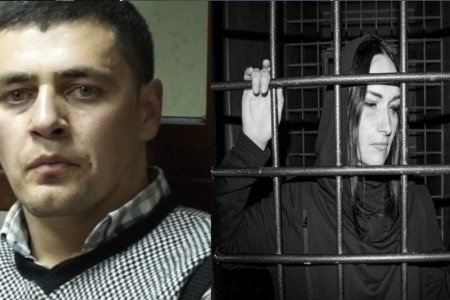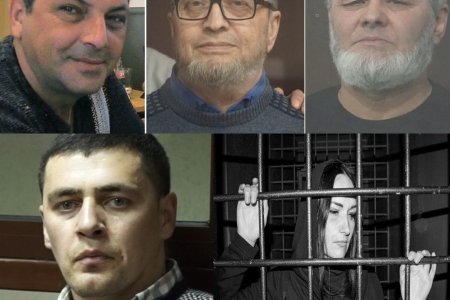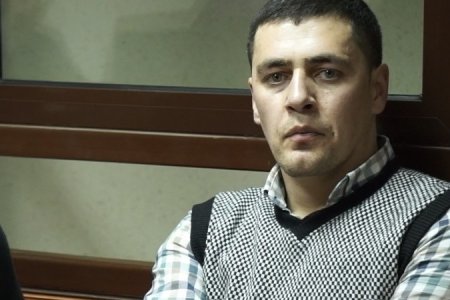
Amet Suleimanov’s health has dramatically worsened since he was taken to a prison in Russia, and any further delay to vital heart surgery will mean that he needs two heart valves replaced and make it unlikely he would survive such an operation. Even Russia has rules about medical conditions that make imprisonment impossible. These, however, are flouted where Crimean Tatar and other Ukrainian political prisoners are concerned. All actors in Russia’s machine of repression have, thus far, been willing to be complicit in delivering a death sentence against Crimean Solidarity civic journalist for reporting on repression in occupied Crimea.
Amet Suleimanov (b. 1984) was one of a very small number of Ukrainian political prisoners whose condition was so clear that even the FSB demanded only that he be placed under house arrest back in March 2020. It is now, unfortunately, clear that there was nothing humanitarian about this; they simply wanted to ensure that the gravely ill Crimean Tatar survived to verdict.
Amet’s wife, Liliya Liumanova has spoken with Crimean Solidarity about the brief meeting she was recently allowed with her husband and also a conversation she managed to have with the head of the medical service. The latter told her that medics have, supposedly, sent a request to Moscow for Suleimanov to be operated on in a cardiology hospital. Liumanova was given no formal confirmation of such an application, nor any information about when a response could be expected.
This is, it should be stressed, an urgently needed operation. If it is not carried out now, Liumanova warns, the load will revert to the second heart valve, and it will be necessary to change not just one, but two heart valves. It is crucial for anybody undergoing major surgery, especially on the heart, that their body is strong enough to cope. Amet has been held prisoner in the appalling conditions of Russian and Russian occupation penal institutions which undermine the health even of those without underlying conditions.
One way of ensuring that this is not another ‘box-ticking’ exercise which ends in a fob-off could be if foreign diplomats became involved. As reported, Russia’s criminal procedure code specifically envisages contact between prisoners and the diplomatic representative offices and consular departments of their country in the Russian Federation. Although Russia has, since 2014, made it impossible for Crimeans living under occupation to not take Russian citizenship, they remain Ukrainian citizens. Although the political prisoners’ Russian passports are one of Russia’s excuses for blocking their release as part of an exchange of prisoners, the Russian authorities did allow the Ukrainian Consul in Rostov (Russia) to visit political prisoners awaiting trial or appeals against sentences. Ukraine was forced to sever all diplomatic relations immediately after Russia’s full-scale invasion on 24 February 2022, and this is where diplomats from other countries can play a crucial role. The same Russian criminal procedure legislation envisages situations where a prisoner’s country does not have diplomatic representatives in the Russian Federation.
In those cases, it says, the prisoners are entitled to such contact “with the representative offices or consular institutions of countries which have taken it upon themselves to defend [the prisoner’s] interests, or with inter-state bodies engaged in the defence of such prisoners”.
If you are from or living in an EU country, the USA, Canada or other democratic countries, please ask your foreign ministry to consider playing such a role. It could save Amet Suleimanov’s life.
Worth noting also that prominent figures, such as US diplomat William Taylor, political philosopher Francis Fukuyama and others have spoken out on behalf of other Crimean Solidarity civic journalists imprisoned on identical charges.
Intervention, even a lot of letters from people in other countries, should, at very least, make those involved in tormenting Amet aware that their actions are being noticed. Lilia explains that her husband suffered a hypertonic crisis in May this year. High blood pressure is causing constant nosebleeds; giddiness; and breathlessness, yet Amet had to fight for a month just to receive the medication that his wife sent for serious cardiovascular issues. She says that some of the medication is passed on, other items are not, with at least one medicine, recommended by his rheumatologist, before he was taken prisoner, refused on the grounds that an almost certainly significantly less qualified prison rheumatologist claimed it to not be needed. They pass on medicine for chest pain and to keep his blood pressure down, but not that for thinning his blood, though his condition and the fact that prison life means little movement, make blood clots a serious risk.
Suleimanov suffers from chronic rheumatic heart disease, aortic insufficiency, coronary artery disease and third level mitral valve prolapse. He needed a heart valve transplant even before his arrest in March 2020, and had been forced to suspend his civic journalist activism because of his worsening state of health. The Russian occupation regime withdrew his invalid status purely because he had refused to be treated in Moscow, rather than in Kyiv. This does not change his diagnosis, nor Russia’s culpability for ignoring it. As a party to the Convention against Torture and Other Cruel, Inhuman or Degrading Treatment or Punishment, it was obliged to recognize the mittee against Torture’s jurisdiction. Instead, it flouted CAT’s order on 22 February 2023 that it abstain from implementing the 12-year prison sentence passed against the civic journalist and recognized political prisoner and has been holding him in detention since April 2023.
The Russian FSB came for Amet Suleimanov (b. 1984); the two elder sons of a renowned Crimean Tatar historian – Seitumer Seitumerov (1988) and Osman Seitumerov (b. 1992) and their maternal uncle Rustem Seitmemetov (b. 1973) on 11 March 2020.
The charges against the men differed little from the claim of ‘counter-revolutionary terrorist propaganda’, used during Stalin’s Terror to execute the Seitumerov brothers’ great-grandfather. In occupied Crimea, Russia is using a deeply flawed Supreme Court ruling from 2003 to imprison men on ‘terrorism’ charges without even accusing them of a recognizable crime, let alone coming up with convincing evidence. The 2003 ruling labelling as ‘terrorist’ the peaceful transnational Hizb ut-Tahrir Muslim organization, which is legal in Ukraine and not known to have committed acts of terror anywhere in the world. Russia has been using this ruling since 2015 in occupied Crimea as a weapon of repression, especially against Crimean Tatar civic journalists and activists. No proof is even needed of actual involvement in Hizb ut-Tahrir, since the FSB invariably plant ‘prohibited literature’ which they then claim to have found during armed searches which lawyers are pretended from being that. They then send transcripts of illicitly taped and quite innocuous conversations about religion, Russian persecution, events in Crimea to their own FSB-‘experts’ who claim that this or that word ‘proves’ involvement in Hizb ut-Tahrir. They also recruit ‘anonymous witnesses’ who invariably repeat the indictment, while proving suspiciously unable to provide any other details about the defendants whom they claim to have known well. All of this is seen and clearly understood by the ‘judges’ who prevent the defence from asking questions which demonstrate that such ‘witnesses’ are lying and that the ‘experts’ have no competence to express an opinion.
Seitumer Seitumerov was charged under the more serious Article 205.5 § 1 of Russia’s criminal code with ‘organizing a Hizb ut-Tahrir group’, while his brother, uncle and Suleimanov were charged with ‘involvement’ in this entirely unproven ‘group’, under Article 205.5 § 2. All of the men were also accused of ‘planning a violent uprising’ (Article 278) although even the FSB admitted that not one of them was suspected of actions or direct plans to commit any action aimed at ‘overthrowing the Russian constitutional order’
The three family members were immediately remanded in custody and remain imprisoned to this day. Suleimanov was held under house arrest, ‘attending’ the ‘trial’ via video link from occupied Crimea.
Despite the flawed charges, non-existent evidence and the fact that any custodial sentence would kill one of the men, prosecutor Yevgeny Nadolinsky demanded horrific sentences against all four men, including 13 years in the case of Suleimanov (whom he had previously tried to get remanded in custody). On 29 October 2021, three ‘judges’ from the Southern District Military Court in Rostov (Russia) - Igor Kostin (presiding judge); Roman Plisko and Yevgeny Zviagin – largely obliged, sentencing Seitumer Seitumerov to 17 years; Osman Seitumerov to 14 years; Rustem Seitmemetov to 13 years and Amet Suleimanov to 12 years. All of these sentences are for the worst of Russian penal institutions, with the first 3.5 years to be spent in a prison, where the conditions are most shocking.
These sentences were upheld on 9 February 2023, by ‘judge’ Aleksandr Aleksandrovich Mordovin from the Military Court of Appeal in Vlasikha (Moscow region).
Please also write to Amet Suleimanov!
Letters need to be in Russian, handwritten, and on ‘safe’ subjects. If that is a problem, use the sample letter below (copying it by hand), perhaps adding a picture or photo. Do add a return address so that the men can answer.
Example letter
Привет,
Желаю Вам крепкого здоровья и надеюсь, Вы скоро вернетесь домой, к своим родным. Простите, что мало пишу – мне трудно писать по-русски, но мы все о Вас помним.
[Hi. I wish you good health and hope that you will soon be home, with your family. I’m sorry that this letter is short – it’s hard for me to write in Russian., but you are not forgotten. ]
Address (which can be in Russian or English)
600020 Россия, Владимирская обл., Владимир, Большая Нижегородская ул., 67,
ФКУ Т-2 "Владимирский централ"
Сулейманову, Амету Рефатовичу, г.р. 1984
Or in English
600020 Russia, Vladimir oblast, Vladimir 67 Bolshaya Nizhegorodskaya St, Prison No. 2 ‘Vladimir Central’
Suleimanov, Amet Refatovich, b. 1984



